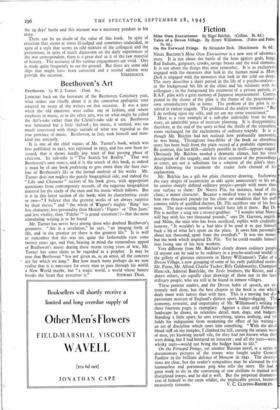Fiction
Mine Own Executioner. By Nigel Balchin. (Collins. 8s. 6d.)
On the Forward Fringe. By Alexander Beck. (Hutchinson. 8s. 6d.)
NIGEL BALCHIN'S Mine Own Executioner is a new sort of adventure story. It is not about the battle of the hero against gods, kings, Red Indians, gangsters, crooks, savage beasts and the wild elements. It is not about the things that men remember. It is as exclusively engaged with the monsters that lurk in the human mind as Moby Dick is engaged with the monsters that lurk in the cold sea deeps. The story describes a short period in the life of a psycho-analyst- in the background his life at the clinic and his relations with his colleagues ; in the foreground his treatment of a private patient, an R.A.F. pilot with a grim memory of Japanese imprisonment. Contra- puntal to the theme of the pilot is the theme of the practitioner's own unsatisfactory life at home. The problem of the pilot is re- solved in violent tragedy. The problem of the analyst remains : " But I do nothing upon my selfe, and yet am my owne executioner."
Here is a rare example of a sub-plot indivisible from its main story, an admirable piece of intricate planning. It is disappointing, therefore, at the end of the story to find the thrills of the consulting room exchanged for the excitements of ordinary tragedy. It is as though Mr. Balchin had not realised how profoundly interesting he was being. Throughout four-fifths of the book an absorbing story has been built from the plain record of a probable experience. By contrast, this last fifth—entirely possible in itself—appears staged. "Obviously Mr. Balchin_ needed a dramatic climax, but his vivid description of the tragedy, and his clear account of the proceedings in 'court, are not a substitute for a solution of the pilot's story. After following the treatment the reader feels cheated of his explanation.
Mr. Balchin has a gift for plain character drawing. Eschewing the easy shapes of eccentricity as aids quite unnecessary to his art, he creates sharply defined ordinary people—people with more than one surface to them: Dr. Norris Pile, for instance, head of the clinic, a minor character. Because a medical trust is ready to give him two thousand pounds for his clinic on condition that his staff consists solely of qualified doctors, Dr. Pile sacrifices one of his best men. The easy-scoring novelist would have left it there. But Dr. Pile is neither a scug nor a money-grubber. " I wonder what Norris will buy with his two thousand pounds," says Dr. Garston, angrily, and Milne, the man who has been sacrificed, replies with creditable honesty, " It wouldn't be a bad idea if he used it to pay himself back a bit of what he's spent on the place. It owes him personally about ten thousand, apart from the overdraft." It was not money but the work which inspired Dr. Pile. Yet he could muddle himself into losing one of his best workers.
Very different from Mr. Balchin's clearly drawn ordinary people (if anyone can be said to be ordinary in a psycho-analysed world) is the gallery of glorious extroverts in Henry Williamson's Tales of a Devon Village, a new grouping of some of his early published stories. Mr. Furze, Mr. Alford, Charlie Tucker, Billy Goldsworthy, Champion Hancock, Admiral Bamfylde, the Zeale brothers, the Rector, and a dozen others, are equally clear drawings of those not in the least ordinary people, who are still to be found in remote villages.
These portrait studies, and the Devon habit of speech, are ex- tremely well done, but the best chapter in the bock is one which deals more with nature than with men. This is a moving but dis- passionate account of England's dirtiest sport, badger-digging. The economy, restraint, and impartiality of Mr. Williamson's writing in these fourteen pages is exemplary. Against a clear cold February landscape he draws, in relentless detail, men, dogs, and badgers. Standing a little apart, he sees everything, spares nothing, and yet holds his indignation from weakening the effect of his writing— an act of discipline which costs him something. " With the dried blood stiff on my temples, I climbed the hill, cursing the satanic ways of men, yet knowing myself vile, for they had not known what they were doing, but I had betrayed an innocent; and all the tears—weak, whisky tears—would not bring the badger back to life."
On the Forward Fringe, yet another Russian novel, is a series of documentary pictures of the troops who fought under General Panfilov in the brilliant defence of Moscow in 1941. The descrip- tions are clear, but the reader's sympathies may be alienated by the humourless and portentous prig who tells the story. He had a great work to do in the converting of raw civilians to trained and disciplined troops, and he did it well. But the perpetual dramatisa- tion of himself as the stern soldier, the implacable patriot, becomes


























 Previous page
Previous page